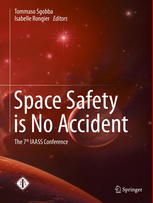

Most ebook files are in PDF format, so you can easily read them using various software such as Foxit Reader or directly on the Google Chrome browser.
Some ebook files are released by publishers in other formats such as .awz, .mobi, .epub, .fb2, etc. You may need to install specific software to read these formats on mobile/PC, such as Calibre.
Please read the tutorial at this link: https://ebookbell.com/faq
We offer FREE conversion to the popular formats you request; however, this may take some time. Therefore, right after payment, please email us, and we will try to provide the service as quickly as possible.
For some exceptional file formats or broken links (if any), please refrain from opening any disputes. Instead, email us first, and we will try to assist within a maximum of 6 hours.
EbookBell Team

4.1
100 reviewsIncludes the proceedings from the 7th IAASS Conference, "Space Safety is No Accident," held in Friedrichshafen, Germany, in October 2014.
The 7th IAASS Conference, “Space Safety is No Accident” is an invitation to reflect and exchange information on a number of topics in space safety and sustainability of national and international interest. The conference is also a forum to promote mutual understanding, trust and the widest possible international cooperation in such matters. The once exclusive “club” of nations with autonomous sub-orbital and orbital space access capabilities is becoming crowded with fresh and ambitious new entrants. New commercial spaceports are starting operations and others are being built.
In the manned spaceflight arena a commercial market is becoming a tangible reality with suborbital spaceflights and government use of commercial services for cargo and crew transportation to orbit. Besides the national ambitions in space, the international cooperation both civil and commercial is also gaining momentum. In the meantime robotic space exploration will accelerate and with it the need to internationally better regulate the usage of nuclear power sources. Space-bound systems and aviation traffic will share more and more a crowded airspace, while aviation will increasingly rely on space-based safety-critical services. Finally, most nations own nowadays space assets, mainly satellites of various kinds and purposes, which are under the constant threat of collision with other spacecraft and with the ever increasing number of space debris. Awareness is increasing internationally (as solemnly declared since decades in space treaties) that space is a mankind asset and that we all have the duty of caring for it. Without proactive and courageous international initiatives to organize space, we risk to negate access and use of space to future generations.